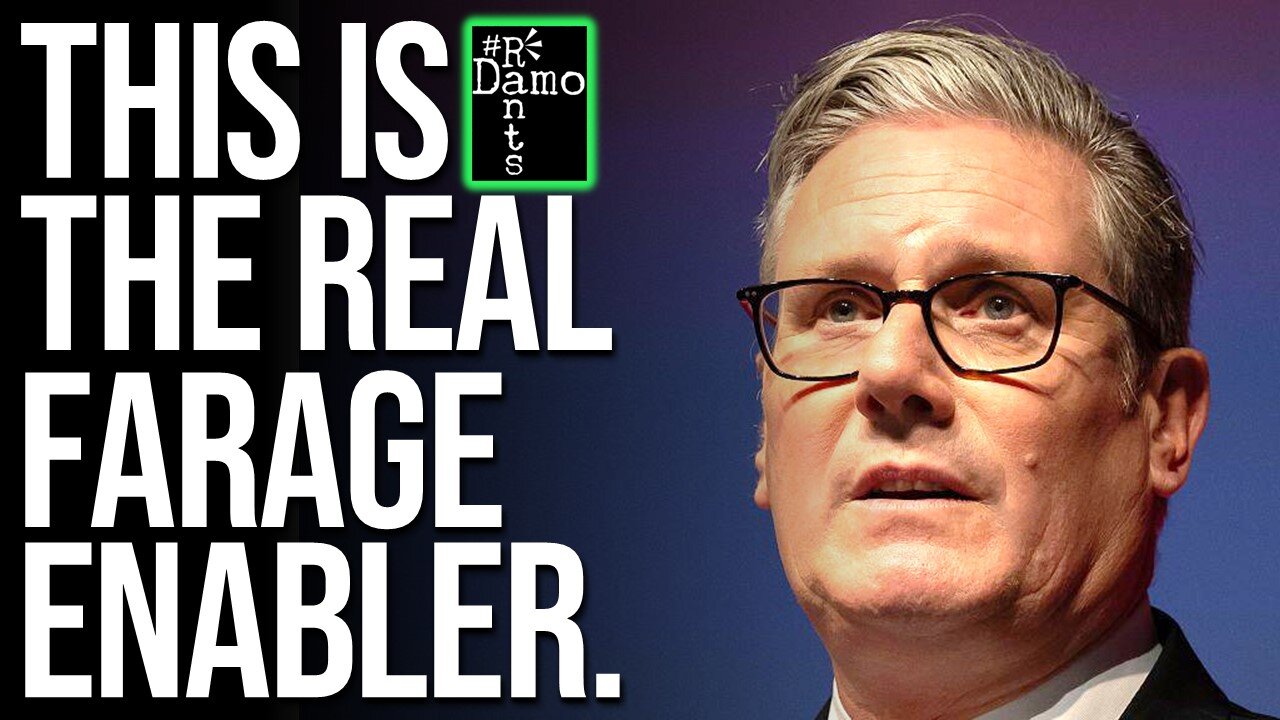Premium Only Content

Has Jeremy Corbyn Just SEALED Keir Starmer's Fate?
Right, so Keir Starmer wants you to believe Jeremy Corbyn is yesterday’s news — a political ghost, shuffling irrelevantly on the fringes. Yet, strangely, this supposedly irrelevant man is also, according to Labour HQ, the single biggest threat to stopping Nigel Farage. Square that hole. Well, when you dig into it, the logic is as laughable as it is desperate: Starmer can stand down his own candidate to hand Farage an easy General Election win in Clacton, copy Reform UK’s immigration rhetoric pretty much word for word, alienate millions of Labour’s natural supporters having told them if you don’t like my way of doing things, then there’s the door — and still point the finger at Corbyn for ‘helping the far right.’ The truth is the same now, as it was back when Corbyn was leading Labour - Corbyn terrifies Starmer and those like him not because he would empower Farage, but because he could stop him and with the likes of a potential Zack Polanski led Green Party also in play, this goes double — something Starmer, Britain’s real Farage enabler, has spectacularly failed to do.
Right, so British politics is currently being gripped by a remarkable contradiction. Jeremy Corbyn is described daily by Keir Starmer’s Labour Party and the bulk of Britain’s establishment political media as a relic of the past — irrelevant, toxic, and unelectable. Yet, simultaneously, these same voices insist that Corbyn is uniquely dangerous, that his potential new party could destroy Labour’s electoral chances and hand power to Nigel Farage’s Reform UK. This narrative is so self-contradictory it verges on absurdity. If Corbyn were truly irrelevant, why would Labour spend so much time demonising him? Why, if his ideas are supposedly toxic, does Starmer warn that even a small Corbynist breakaway could cost Labour power? And most importantly, how is it that the man who quite literally stood down Labour’s candidate against Farage in Clacton — helping him to finally achieve a parliamentary victory — now wants voters to believe Corbyn is the real danger to stopping the far right?
The reality is clearly very different and given what happened to Corbyn before, we should all be more aware of it this time. Starmer, not Corbyn, is Farage’s greatest political asset. Farage’s rise is not the result of left-wing politics but of Starmer’s conscious political strategy, which has alienated millions of Labour’s traditional supporters, legitimised Reform’s populist rhetoric, and rebranded Labour as a safe pair of hands for Britain’s political and economic establishment – definitely not we ordinary working class people though. Reform UK’s surge is not an accident; it is the predictable outcome of a Labour Party that has chosen to mimic right-wing rhetoric rather than confront it. By copying their policies Starmer legitimises them. People will always tend towards the real thing and not a tribute act, which is all Starmer will ever be, not having any ideas of his own, lurching from one populist position to the next. Meanwhile, Corbyn — and increasingly, a Green Party under the insurgent leadership bid of Zack Polanski — represents one of the few serious threats to Reform’s growing momentum. Both offer something Starmer does not: a credible, principled anti-establishment alternative capable of appealing to the same disillusioned voters who are now flocking to Farage.
The clearest evidence of Starmer’s role in Farage’s rise is found in Clacton itself, somewhere Farage still isn’t very familiar with, despite him being their MP. This was the symbolic battleground where Farage returned to Parliament — and Starmer effectively gave him a free pass. Jovan Owusu-Nepaul, a young Labour candidate with great potential, became very popular locally, was selected to fight the seat. But then Labour’s national machinery all but abandoned it. Owusu-Nepaul was ordered back to the Midlands to help shore up the defence of establishment MPs there who were struggling with Muslim voters, not taken in by Starmer, and the whole Labour Clacton campaign was left without serious organisational backing, all campaign resources were scaled back, and his support from Labour HQ was over. He still managed to finish third, despite being reduced to a paper candidate, winning 16.2% of the vote, while Farage romped home with 46.2%. We’ve never had an adequate reason given for why Labour did this, though Owusu-Nepaul’s online popularity at one point was rivalling Starmer’s and one allegation given at the time was that Starmer was simply jealous of him. But for a leader who claims to be Britain’s main line of defence against the far right, this was worse than any notion of cowardice, of running away from Farage; it was a symbolic endorsement of Farage’s legitimacy.
This Clacton capitulation is emblematic of Starmer’s broader strategy, which has actively validated Reform UK’s framing of Britain’s political debate. Starmer has consistently adopted Tory and Reform talking points on immigration, welfare, and crime, believing he can neutralise the populist right by imitating it. But the logic is as cynical as it is flawed. As political history repeatedly demonstrates — from Ed Miliband’s failed triangulation on immigration in 2015, which saw Yvette Cooper brandishing her immigration mug, to Gordon Brown’s “British jobs for British workers” rhetoric — when mainstream parties chase right-wing populists on their own terrain, they only legitimise their worldview. The voters who care most about immigration do not reward the imitation; they vote for the original.
Nowhere is this clearer than in Starmer’s immigration stance. His repeated talk of “controlling borders” and refusal to rule out offshore detention centres have made Labour almost indistinguishable from the Conservatives on this issue. The problem is that Farage has spent years branding himself as the authentic voice of anti-immigration politics, stood on cliff tops, pointing at small boats. When Starmer echoes his language, it is Farage who benefits, as voters see him as the consistent and uncompromising version of the message Starmer now parrots.
Starmer’s embrace of the two-child benefit cap has been just as damaging. By refusing to scrap one of the cruellest austerity-era policies, Starmer alienates the very working-class families Labour once represented, while signalling to Tory voters that Labour is “tough” on welfare. But these voters are not impressed by penny-pinching Labour technocrats; they see only hypocrisy. The Financial Times has documented how Reform UK’s support is growing fastest in areas with high child poverty — precisely the communities hit hardest by this cap. Starmer has effectively driven voters into Farage’s arms by confirming their suspicion that Westminster politicians do not care about ordinary families.
Starmer’s foreign policy has further alienated Labour’s base. His refusal to call for a ceasefire in Gaza, despite Israel’s relentless bombardment, angered Labour’s Muslim voters and anti-war activists. In cities such as Birmingham, Leicester, and Bradford, where Labour’s majorities once seemed unassailable, voters either abstained or turned to protest candidates. Farage, with characteristic opportunism, has exploited this anger by claiming to listen to voices ignored by the political elite, even as his own record offers no real solidarity to those suffering abroad.
The data proves that Starmer’s strategy is failing. A June 2025 Ipsos poll put Reform UK at 34 percent, nine points ahead of Labour’s 25 percent. YouGov’s MRP modelling projected Reform as the largest party if an election were held, with around 271 seats compared to Labour’s 178. Farage’s personal favourability has improved, reaching +5 among Conservative voters, while Starmer’s net favourability has sunk to –46, his worst rating since becoming Labour leader and it just keeps on worsening. Starmer’s great gamble — that moving right would make Labour electable and stop Reform — has backfired. The voters he chases do not trust him, and the voters he once had are abandoning him for the same reason. Everyone, both left and right sees Starmer for the rampantly dishonest opportunist that he is.
Against this record, Labour’s insistence that Corbyn is the real danger to beating Farage is absurd. The argument that Corbyn would split the left and help Reform UK is not only wrong; it is dishonest political gaslighting. Farage’s rise has nothing to do with Corbynism, there is no new party quite yet, and everything to do with the failures of Labour’s right wing.
Corbyn’s political record demonstrates that his policies appeal to precisely the voters Starmer has lost. His 2017 campaign achieved Labour’s biggest vote-share increase since 1945, winning 40 percent of the vote and mobilising millions of young voters as well as making gains in Leave-voting, working-class areas. Seats such as Canterbury, which had been Conservative for a century, fell to Labour under Corbyn, while areas like Mansfield and Stoke-on-Trent saw sharp increases in Labour’s vote share. Many of these areas are now trending toward Reform UK. So the lesson is clear: left-wing, anti-austerity policies can win back these voters, while copying Reform cannot.
Farage’s support is not rooted in ideological support for Thatcherite economics; it is a protest vote against a system perceived as indifferent to ordinary people. Corbyn’s 2017 and 2019 manifestos offered solutions to the grievances driving this protest. Public ownership of rail, mail, water, and energy; massive investment in the NHS and social care; regional industrial strategies; and taxes on the wealthy to fund these programmes spoke directly to communities starved of hope.
Corbyn’s credibility as an anti-establishment figure also sets him apart. Unlike Farage, whose anti-elite persona hides his ties to hedge funds and right-wing think tanks, or Starmer, who courts corporate donors, Corbyn has consistently refused corporate money, opposed disastrous foreign interventions, and stood with trade unions. His authenticity is precisely what could reclaim protest voters currently backing Reform out of despair.
Labour’s own panic over Corbyn’s prospective new party, reported by Al Jazeera and The London Economic, reveals the truth. Starmer’s strategists are not worried that Corbyn will hand seats to Farage; they are worried he will expose Labour’s betrayal of its base by drawing back the voters Starmer has lost. Starmer’s smears — portraying Corbyn as “toxic” or “unelectable”— are not about electoral arithmetic; they are about protecting the political and economic networks Starmer has now aligned Labour with.
Corbyn is not the only figure threatening Britain’s political establishment though. Zack Polanski’s leadership bid for the Green Party represents another serious challenge to both Starmer and Farage. Polanski has rebranded the Greens as an explicitly anti-establishment force, combining environmentalism with economic populism.
As Novara Media have reported, Polanski calls his approach “eco-populism,” a strategy that directly challenges Farage’s populism, using similar wording but uses it to attack corporate greed and demand wealth redistribution, the very things Farage is actually representative of. His leadership campaign has already triggered an 8 percent surge in Green membership, pushing the party close to its 2015 record high and voting for the Green leadership still hasn’t even opened yet. His emphasis on issues like sewage dumping, water bills, and energy privatisation resonates with rural and coastal voters who feel abandoned by both major parties and who currently vent their anger through Reform.
Polanski also threatens Labour by offering a home to young progressives, former Corbyn supporters, and pro-Palestinian activists alienated by Starmer’s managerial centrism. His strategy is explicitly aimed at mobilising the “politically homeless,” the same constituency Farage currently exploits dishonestly, but also what Corbyn was so good at doing too.
A Corbyn-led party and a Polanski-led Green Party would complement one another rather than compete though. Corbyn’s strongest appeal is in working-class, deindustrialised Labour heartlands, while Polanski thrives in urban, university, and environmentally conscious constituencies. Together, they represent a credible left-populist challenge that could reclaim voters from both Labour and Reform and if they can work together, which I personally would love to see as a former Corbyn era Labour member, but as a Green Party member now. The splitting the left argument risks being deployed here if those conversations aren’t had.
Starmer’s attacks on Corbyn, and his likely future hostility toward Polanski, are rooted in fear. Both threaten not Labour’s “electability” but the system Starmer now serves. Corbyn and Polanski’s policies on public ownership, wealth taxes, and anti-privatisation directly threaten Labour’s corporate donors. Both also threaten Starmer’s core narrative: that Labour is the only alternative to Tory or Reform rule, when really they are much the same. If either begins reclaiming protest voters, Starmer’s argument collapses.
More fundamentally, Corbyn and Polanski threaten to expose Labour as what it now is: a party of the establishment. The establishment has always been more tolerant of Farage than Corbyn because Farage does not threaten corporate wealth or Britain’s entrenched class hierarchy. Starmer is fighting to keep Labour as a safe opposition within that hierarchy, not to challenge it.
The great political lie collapses under scrutiny. Starmer, not Corbyn, is Britain’s real Farage enabler. His rightward shift, abandonment of Labour’s base, and embrace of establishment orthodoxy have turbocharged the very anger Farage feeds on.
Corbyn and Polanski, far from helping Farage, represent the only serious threats to his populist appeal. Both offer principled, anti-establishment alternatives that speak to the grievances driving Reform’s surge. That is why they are attacked so ferociously: because they threaten not just Starmer’s electoral prospects but the entire political and economic order Labour now upholds.
If Starmer truly wanted to stop Farage, he would not be fighting Corbyn or Polanski; he would be fighting for the millions of voters he has abandoned. He won’t do that. He sold out. So the title of Britain’s real Farage enabler belongs firmly to Keir Starmer.
The loss of Muslim voters in last years General Election undermined Starmer’s winning narratives too, a man who didn’t so much win, but was simply in the right place at the right time to benefit from the Tory collapse. He’s not very intent on winning any of them back though as he puts Zionist groups in charge of defining Islamophobia. Get all the details of that story in this video recommendation here as your suggested next watch.
Please do also hit like, share and subscribe if you haven’t done so already so as to ensure you don’t miss out on all new daily content as well as spreading the word and helping to support the channel at the same time which is very much appreciated, holding power to account for ordinary working class people and I will hopefully catch you on the next vid. Cheers folks.
-
 29:07
29:07
Tactical Advisor
5 hours agoATF Changes Ruling on SBR & Tacpack unboxing | Vault Room Live Stream 039
44.7K11 -
 2:00
2:00
From Zero → Viral with AI
11 hours ago $0.67 earnedAre You Being Left Behind? Why AI Marketing is No Longer Optional
15.3K1 -
 9:10
9:10
BlackDiamondGunsandGear
8 hours agoI Finally Got it! / Now i need to BUILD IT!
12.4K3 -
 9:44
9:44
Millionaire Mentor
3 days agoCharlie Kirk Brings Woke Student To STUTTERING Over White Privilege Lies
18.3K7 -
 24:12
24:12
MudandMunitions
9 hours agoOff-Roading with NYPrepper Wild Elk & PA’s Most Remote Backroads
10.1K1 -
 LIVE
LIVE
Bannons War Room
7 months agoWarRoom Live
3,460 watching -
 LIVE
LIVE
IsaiahLCarter
9 hours ago $0.74 earnedAPOSTATE RADIO 029: Leftist Violence, & NYC's Mayor's Race (Guests: Lattina Brown and David Sivella)
43 watching -
 10:03:41
10:03:41
LFA TV
16 hours agoLIVE: CHARLIE KIRK VIGIL SERVICE!
175K65 -
 6:59:16
6:59:16
BaldBrad
10 hours agoCharlie Kirk Memorial LIVESTREAM
46.1K6 -
 5:13:13
5:13:13
Professor Nez
1 day ago🚨Charlie Kirk Funeral LIVE: Trump Honors Kirk in Arizona 🇺🇸
37.1K16